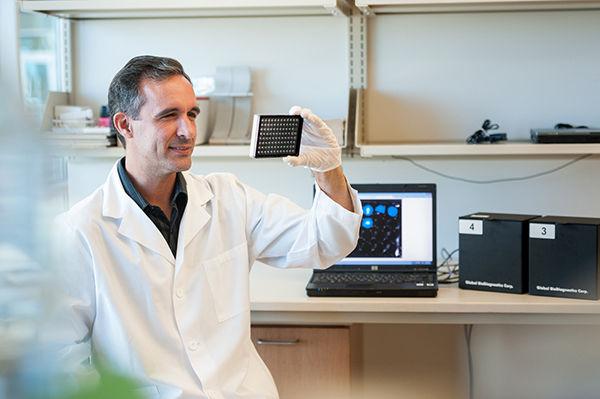English freshman and Battalion writer Alex Perez sat down with Jeffrey Cirillo, professor in the department of microbial pathogenesis and immunology in the Health Science Center. Cirillo has developed a test that can detect tuberculosis in approximately 10 minutes, decreasing wait times for results by months.
THE BATTALION: Could you start off by telling me a little about the test itself?
Cirillo: So what we set out to do initially was to identify a method for tracking tuberculosis. As you can imagine, it’s a microscopic organism; it can’t be seen by the eye. So what we use are compounds that allow amplification of the signal generated by the organism. In the past, there has been no way for doing that with infectious agents. What we wanted to do is something where the organism amplifies the signal, so it doesn’t require any machine. What we developed were these compounds that reacted with the infectious agent, in this case, tuberculosis, but really the technology has very broad application to pretty much any infectious disease. How it works is we add these compounds we’ve developed, and when they react with the organism, they produce a fluorescent product…Previously, to grow TB — to grow the culture and show that someone has TB — it takes six weeks. It’s an extremely slow process. With this test, we can get a diagnostic result within 10 minutes.
THE BATTALION: Is this test still in early trial stages or has it been tested on humans?
Cirillo: It’s still in development. We have a company, called Global BioDiagnostics Corporation, and they are producing this as a commercial product. They are negotiating with a number of different, large diagnostic biotechnology companies currently. We did a series of human trials in our lab with nearly 1,000 samples of human specimen. The sensitivity and specificity were around 90 percent. Now you compare that to microscopy, which can be done in a matter of days to a few weeks, so it’s the fastest method, but it is very low sensitivity – it requires a lot of the organism to be present. Normally, the person has to be sick for about six months before they have enough bacteria to be able to detect by that method.
THE BATTALION: What is the status of testing?
Cirillo: We’re currently testing in Vietnam, Peru, Thailand, Africa — those are the primary places we’re testing. What they are doing is external clinics. They put the test in and see how it performs. If it performs well at this trial, then it goes to the next step of being approved by an entire country.
THE BATTALION: Would this test eventually be administered directly by the doctor?
Cirillo: Yeah, that’s really the goal — the first time they visit a clinic to get a result. The patient doesn’t even have to leave. The test is extremely sensitive because all of the complexity is in the compound that we developed. So all they do is put the compound in the material, put it into a reader, and at 10 minutes they read it and get a result.
THE BATTALION: Recently, there was an outbreak of TB among infants in El Paso. What can you tell us about TB in infants?
Cirillo: The big issue with infants and young children is that they get a more severe form of the disease, so it spreads from the lungs to the other organs more quickly, and when they get sick, they get sicker. Children are about 50 percent of the mortality due to TB. They are more easily infected, they get sicker, and they are more difficult to treat. They have to take antibiotics for longer, and they are more likely to develop side effects due to the antibiotics.
THE BATTALION: You mentioned that the test can be applied to other diseases as well. Was that an initial consideration when developing the test?
Cirillo: I was asked by the Bill and Melinda Gates Foundation initially to come up with a way of tracking TB in animals, and that was not for this purpose as a diagnostic. As it takes six weeks to grow the organism, all research with TB is very slow. Any therapeutic development is delayed because the work is so slow. So that’s why we were initially asked to do the work — could we come up with a way to track it that would allow us to develop vaccines and therapeutics more quickly for TB.
Jeffrey Cirillo, microbial pathogenesis and immunology professor at the Health Science Center, developed a new test for the tuberculosis virus.
Photo provided.
From months to minutes
October 19, 2014

Donate to The Battalion
Your donation will support the student journalists of Texas A&M University - College Station. Your contribution will allow us to purchase equipment and cover our annual website hosting costs.



















